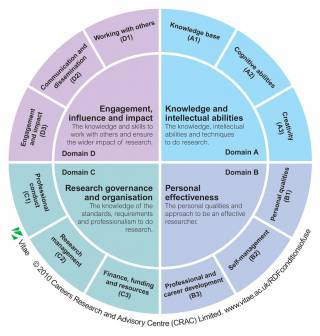Explore the Researcher Development Framework (RDF) to support your personal, professional and career development.
The Vitae Researcher Development Framework (RDF) highlights the four key domains of knowledge, behaviours and attributes needed to become a successful researcher. The framework covers the knowledge, methodologies, personal effectiveness and professional standard needed to create impactful research. Each domain has several sub-domains to assist your researcher development.
UCL's skills development programme is developed from the Researcher Development Framework and based on the four categories listed in the RDF framework.

The Researcher Development Framework will help you to:
- Identify your strengths and your areas of improvement
- Prioritise your personal, professional and career development
- Monitor your progress and success throughout your researcher journey
- Prepare for your progress reviews, appraisals and development conversations with your manager or mentor
- Explore developmental opportunities
- Explore your journey as a researcher and more!
Explore the framework's four domains, with sub-domains skills below:
- Domain A: Knowledge and intellectual abilities
Develop your intellectual abilities, expand your knowledge base and learn the techniques needed to create impactful research.
Sub-domain Skills A1: Knowledge base - Subject knowledge
- Research methods: theoretical knowledge
- Research methods: practical applications
- Information seeking
- Information literacy and management
- Languages
- Academic literacy and numeracy
A2: Cognitive abilities - Analysing
- Synthesising
- Critical thinking
- Evaluating
- Problem solving
A3: Creativity - Inquiring mind
- Intellectual insight
- Innovation
- Argument construction
- Intellectual risk
- Domain B: Personal Effectiveness
Nurture your full potential by becoming a powerful researcher and leader in your field.
Sub-domain Skills B1: Personal qualities - Enthusiasm
- Perseverance
- Integrity
- Self-confidence
- Self-reflection
- Responsibility
B2: Self-management - Preparation and prioritisation
- Commitment to research
- Time management
- Responsiveness to change
- Work-life balance
B3: Professional and career development - Career management
- Continuing professional development
- Responsiveness to opportunities
- Networking
- Reputation and esteem
- Domain C: Research governance and organisation
Understand research policies, research funding, and best practices essential to complete your research.
Sub-domain Skills C1: Professional conduct - Health and safety
- Ethics, principles and sustainability
- Legal requirements
- IPR and copyright
- Respect and confidentiality
- Attribution and co-authorship
- Appropriate practice
C2: Research management - Research strategy
- Project planning and delivery
- Risk management
C3: Finance, funding and resources - Income and funding generation
- Financial management
- Infrastructure and resources
- Domain D: Engagement, influence and impact
Learn the knowledge and skills needed to collaborate with others to ensure the wider impact of research.
Sub-domain Skills D1: Working with others - Collegiality
- Team working
- People management
- Supervision
- Mentoring
- Influence and leadership
- Collaboration
- Equality and diversity
D2: Communication and dissemination - Communication methods
- Communication media
- Publication
D3: Working with others - Teaching
- Public engagement
- Enterprise
- Policy
- Society and culture
- Global citizenship
 Close
Close

